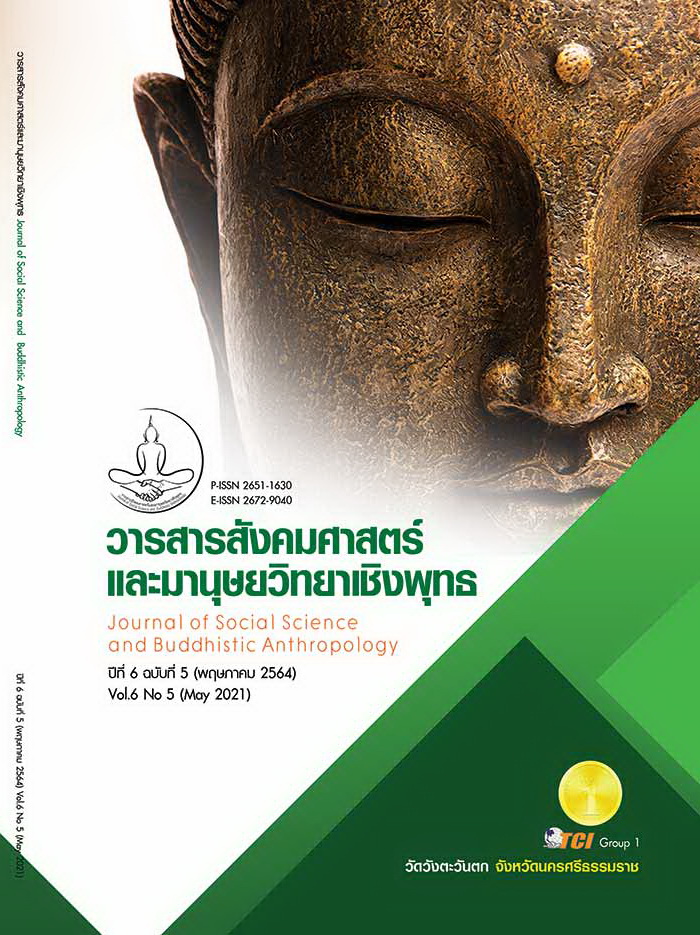A STUDY OF FUNDAMENTAL DATA FOR A DEVELOPMENTAL COURSE TO PROMOTE ETHICAL PROBLEM-SOLVING CAPABILITIES FOR ADOLESCENT IN LAO P.D.R.
Keywords:
Ethical Problem-Solving, Needs and Situation Analysis, Developmental Course, Lao P.D.R.Abstract
The objectives of this research article were to: 1) study the world conditions and education trends of students’ needed skills, 2) analyze the relevant policies both on the national and ministry levels, 3) survey on stakeholders’ opinions and 4) study and analyze related concepts and theories on curriculum development and ethical problem-solving skills. The research is mixed method by using survey research and documentary research. The purposive samples with specific criteria are consisted of group of documents related to the global situation, framework for competences in the 21st century, national policies, vision and educational strategies. The interviewee and focus group are 5 ministry executives, 3 school directors and 9 high school teachers and the respondents were 400 grade 9-10 students. The research results found that: The analysis of global and national educational promotion trends and situations, interviews and discussions and surveying on opinion polls for all stakeholders at all levels highlight the need to a developmental course to promote ethical problem-solving abilities for adolescent in Lao P.D.R. The study and analysis on related theoretical concepts, the researcher could define the principle and conceptual course to promote students' ethical problem-solving abilities starting on practicing through the process of coping with problems encountered in daily life; promoting incentives; adjusting ethical behavior with 3 areas to ethical problem solving, integrating self-learning with cooperative reciprocity through an 8-step ethical problem solving process with emphasis on placing an ethical point of view at every stage. Under the promotion of learning process through 3 main learning content, which must be developed simultaneously (Critical thinking Decision making and ethics)
References
กระทรวงศึกษาธิการและกีฬา. (2010). หลักสูตรมัธยมศึกษาตอนต้น. นครหลวงเวียงจันทน์: สถาบันค้นคว้าวิทยาศาสตร์การศึกษา.
กระทรวงศึกษาธิการและกีฬา. (2011). หลักสูตรมัธยมศึกษาตอนปลาย. นครหลวงเวียงจันทน์: สถาบันค้นคว้าวิทยาศาสตร์การศึกษา.
ช่อเอื้อง อุทิตะสาร และคณะ. (2560). ผลจากการใช้กระบวนการกลุ่มในการสอนทักษะการแก้ปัญหาทางคณิตศาสตร์. ใน การประชุมวิชาการระดับชาติ มหาวิทยาลัยราชภัฏเพชรบูรณ์ ครั้งที่ 4 (หน้า 268-274). มหาวิทยาลัยราชภัฏเพชรบูรณ์.
ญาณี เพชรแอน และสุเทพ อ่วมเจริญ. (2558). การศึกษากระบวนการแก้ปัญหาอย่างสร้างสรรค์ เรื่อง อาหารกับสุขภาพ รายวิชาสุขศึกษา สำหรับนักเรียนชั้นมัธยมศึกษาปีที่ 3. Veridian E-Journal, Silapakorn University ฉบับภาษาไทย สาขามนุษยศาสตร์ สังคมศาสตร์และศิลปะ, 8(2), 2080-2091.
มึกบ่แห้ง (นามแฝง). (2020). เมื่อการฆ่าตัวตายเป็นเรื่องใหญ่ของโลก: จะป้องกันสิ่งนี้อย่างไร ลาวพัฒนา. เรียกใช้เมื่อ 10 มีนาคม 2020 จาก https://www.laophattananews. com/archives/66865
Chounlamany, K. (2014). School education reform in Lao PDR: good intentions and tensions? Centre international d'études pédagogiques, Symposium: Education in Asia in 2014: What global challenges? Retrieved March 26, 2020, from from https://journals.openedition.org/ ries/3766
Gardner, H. (2007). Five Minds for the Future. Boston, MA: Harvard Business School Publishing.
Ghonoodi, A. & Salimi, L. (2011). The Study of Elements of Curriculum in Smart Schools. Procedia-Social and Behavioral Sciences, 28(2011), 68-71.
Kohlberg, L. (1976). Moral Stages and Moralization: The Cognitive Developmental Approach. Moral Development and Behavior: Theory, Research and Social Issues, 4-5. New York: Holt, Rinehart and Winston.
Lao People’s Revolutionary Youth Union & United Nations Population Fund. (2014). Adolescent and Youth Situation Analysis Lao People’s Democratic Republic: Investing in Young People is Investing in the Future. Lao People's Revolutionary Youth Union, LYU, Lao PDR. Retrieved October 18, 2020, from https://lao.unfpa.org/sites/default/ files/pub-pdf/Final_Eng_AYSA% 20Report.pdf
MacKinnon, A. & Thepphasoulithone, P. (2014). Educational Reform In Laos: A Case Study. International Journal of Educational Studies, 1(1), 19-34.
Ministry of Planning and Investment. (2015). The 4th Population and Housing Census Lao Statistics Bureau. Retrieved August 1, 2020, from https://www. lsb.gov.la
Ministry of Planning and Investment. (2018). Mid-Term Review of the Eighth National Socioeconomic Development Plan, 2016-2020 (19 October 2018 Vientiane). Retrieved August 1, 2020, from https://data.opendevelopmen tmekong.net/dataset/3-8-2016-2020/resource/0833d7be-88ef-433c-9af8-82b6337d1817
Piaget, J. (1965). Language and thought of the child. New York: Harcourt, Brace & World.
Power, C. (2014). The Power of Education: Education for All, Development, Globalization and UNESCO (2015th ed.). London: Springer.
Shin, N. et al. (2003). Predictors of Well-Structured and ILL-Structured Problem Solving in an Astronomy Simulation. Journal of Research in Science Teaching, 40(1), 6-33.
Taba, H. (1962). Curriculum Development: Theory and Practice. New York: Harcout Brace & World.
Tyler, R. W. (1950). Basic Principle of Curriculum and Instruction. Chicago: University of Chicago Press.
UNFPA State of Lao Population. (2019). Gender Vulnerabilities of Boys and Girls Throughout the Lifespan in Lao PDR. Vientaine: UNFPA Lao PDR. Retrieved August 1, 2020, from https://lao.unfpa.org/en/publications/gender-vulnerabilities-boys-and-girls-throughout-lifespan-lao-pdr
United Nations. (2015). Country Analysis Report:Lao PDR, Analysis to inform the Lao People’s Democratic Republic–United Nations Partnership Framework (2017-2021). Retrieved August 8, 2020, from https://laopdr. un.org/en/13290-lao-pdr-united-nations-partnership-framework-sustainable-development-2017-2021-2015-country
United Nations Educational, Scientific and Cultural Organization. (2015). Rethinking education: towards a global common good? Retrieved August 1, 2020, from https://unesdoc.unesco.org/ark:/48223/pf0000232555
United Nations Educational, Scientific and Cultural Organization. (2018). Mapping research and innovation in Lao People's Democratic Republic, G. A. Lemarchand and April Tash, eds. Technology and Innovation Policy, 7(2018), 45-67.
Voice of America Laos News. (2010). Lao Youths Increasingly Involved With Drug Trafficking and Crimes. Retrieved October 18, 2020, from https://lao.voanews.com/a/a-52-2010-03-10-voa4-90693559/1188 475.html
World Economic Forum. (2016). The Future of Jobs:Employment, Skills and Workforce Strategy for the Fourth Industrial Revolution. Retrieved November 12, 2020, from http://www3.Weforum.org/docs/WEF_Future_ of_Jobs.pdf
World Health Organization. (2017). The Ministry of Health reviewed health profession education reforms with support from WHO and the Luxembourg Government. Retrieved November 11, 2020, from from https://www.who.int/laos/news/detail/01-09-2017-the-ministry-of-health-reviewed-health-profession-education-reforms-with-support-from-who-and-the-luxembourg-government









